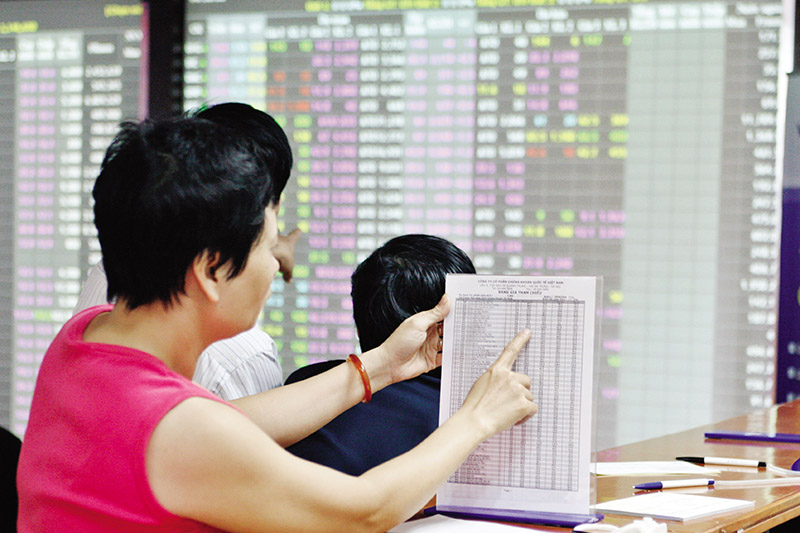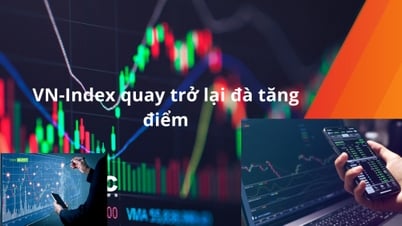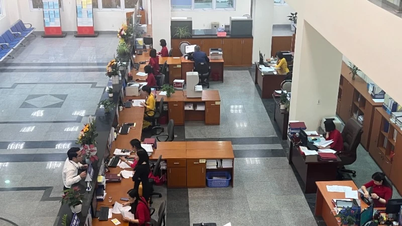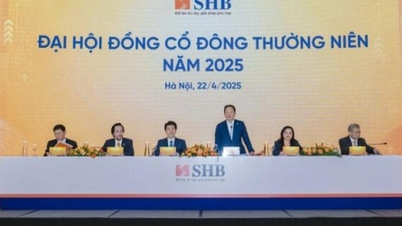On average, in the Vietnamese stock market, only one in 25 businesses publishes information in English. Improving information transparency will help businesses open the door to foreign capital in the future.
 |
| Having an advantage in the stock market are businesses that are transparent about information and focus on ESG. Photo: Duc Thanh |
Plus points from corporate governance
The Vietnam Institute of Directors (VIOD) has just launched an initiative to create a bridge for Vietnamese listed companies to access international corporate governance practices, through gathering companies that practice and commit to good corporate governance practices beyond compliance into the VNCG50 group.
According to Ms. Vu Thi Chan Phuong, Chairwoman of the State Securities Commission, in order for the Vietnamese stock market to continue to develop and implement the upgrading strategy, improving corporate governance is becoming increasingly urgent. This initiative, if well implemented, will also be a driving force to help raise Vietnam's governance score compared to the region.
In the past year, in the context of foreign capital flowing into developed countries, corporate governance has also been an important keyword that securities management agencies in some Asian countries are orienting listed enterprises to overcome the situation of cheap stock valuation.
In early 2024, the Financial Services Commission (FSC) of Korea announced its first reform program to enhance the value of listed companies. The Corporate Value-up Program requires companies to include a plan to enhance their corporate value in their corporate governance reports. Companies with outstanding disclosure activities during the year will be awarded prizes along with some tax benefits. The FSC also plans to create a new index that includes companies with high shareholder returns, from which ETFs can be built.
 Many businesses believe that if their business is doing well and they do not need foreign partners, they do not need to publish information in English. In fact, for listed companies, it is very important to provide complete information to investors to have a correct understanding of the business. To do this, chairmen and CEOs need to correctly assess the problem and work together to build good "goods" for the stock market.
Many businesses believe that if their business is doing well and they do not need foreign partners, they do not need to publish information in English. In fact, for listed companies, it is very important to provide complete information to investors to have a correct understanding of the business. To do this, chairmen and CEOs need to correctly assess the problem and work together to build good "goods" for the stock market. 
- Mr. Pham Hong Son, former Vice Chairman of the State Securities Commission
In late June 2024, the Thai Ministry of Finance and the stock market regulators announced quite drastic measures to revive the market in the context of plummeting stock indexes and net foreign selling. Among them, they adjusted some conditions for the Thai ESG fund, which has a portfolio with 80% of its net asset value invested in companies that meet the requirements for environmental, social and governance information disclosure. At the same time, they encouraged listed companies to pay more attention to compliance with environmental, social and governance (ESG) issues, especially corporate governance.
In Vietnam, the first corporate governance code, applicable to listed enterprises, was issued in 2007 in Decision No. 12/2007/QD-BTC. Subsequently, Circular No. 121/2012/TT-BTC of the Ministry of Finance and Decree No. 71/2017/ND-CP of the Government set out more specific regulations.
In 2019, the first version of the Corporate Governance Code consisted of 10 principles, focusing on the content groups of board responsibilities, control environment, information disclosure and transparency, shareholder rights and stakeholder relations. Beyond mandatory compliance, the Code also includes content according to international good practices.
With the VNCG50 initiative, businesses need to focus on ESG to meet international standards and attract capital from potential investors. In particular, 4 factors are highlighted including increasing transparency and financial reporting; improving governance standards; attracting investment and improving corporate image; sustainable development and social responsibility.
Overcoming the language "barrier"
The Vietnamese stock market aims to be upgraded to a secondary emerging market by 2025. The biggest expectations are placed on the FTSE's review in March and September next year. When the door opens, it is expected that foreign capital will flood in. However, according to Ms. Ha Thu Thanh, Chairwoman of VIOD, when the market is upgraded, not all businesses will be allocated capital equally, but this capital will only go to companies with transparent governance and the effectiveness of this activity has been assessed.
After 24 years of official operation (July 20, 2000) and preparing for the first trading session with only 2 stocks, the scale of the 3 Vietnamese stock exchanges has now increased to approximately 1,800 enterprises. However, with some fairly basic requirements on governance according to international practices, many Vietnamese enterprises still cannot meet. According to VIOD, currently only 80 enterprises publish reports in English.
From the perspective of a securities company actively participating in the role of connecting capital in the market, according to Mr. Nguyen Khac Hai, Director of the Law and Compliance Department of SSI Securities Company, the major obstacle for foreign investors is also the level of access to information in English of listed companies according to world standards. Securities companies themselves support the connection between listed companies and foreign investors through analytical reports in English, but initial "raw information" from companies in international languages is still very necessary.
Information plays an important role in the stock market. Information transparency is essentially aimed at helping the stock market to effectively allocate capital and find a reliable investment "address". However, according to Mr. Bui Hoang Hai, Vice Chairman of the State Securities Commission, it will take time to change the awareness of businesses, from disclosing information to meet the requirements of management agencies to starting from the interests of the business itself.
Source: https://baodautu.vn/tang-gia-tri-doanh-nghiep-tu-yeu-to-quan-tri-d220295.html



![[Photo] General Secretary concludes visit to Azerbaijan, departs for visit to Russian Federation](https://vphoto.vietnam.vn/thumb/1200x675/vietnam/resource/IMAGE/2025/5/8/7a135ad280314b66917ad278ce0e26fa)
![[Photo] National Assembly Chairman Tran Thanh Man chairs the meeting of the Subcommittee on Documents of the First National Assembly Party Congress](https://vphoto.vietnam.vn/thumb/1200x675/vietnam/resource/IMAGE/2025/5/8/72b19a73d94a4affab411fd8c87f4f8d)

![[Photo] Prime Minister Pham Minh Chinh meets with the Policy Advisory Council on Private Economic Development](https://vphoto.vietnam.vn/thumb/1200x675/vietnam/resource/IMAGE/2025/5/8/387da60b85cc489ab2aed8442fc3b14a)
![[Photo] President Luong Cuong presents the decision to appoint Deputy Head of the Office of the President](https://vphoto.vietnam.vn/thumb/1200x675/vietnam/resource/IMAGE/2025/5/8/501f8ee192f3476ab9f7579c57b423ad)





















































![[Photo] Prime Minister Pham Minh Chinh talks on the phone with Singaporean Prime Minister Lawrence Wong](https://vphoto.vietnam.vn/thumb/402x226/vietnam/resource/IMAGE/2025/5/8/e2eab082d9bc4fc4a360b28fa0ab94de)































Comment (0)